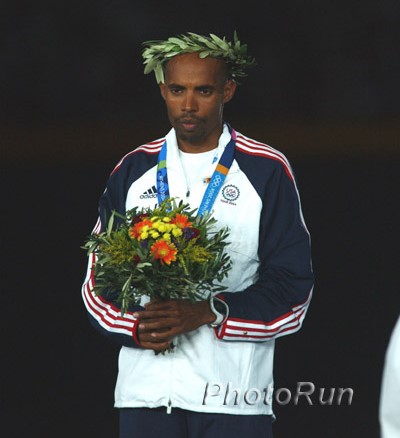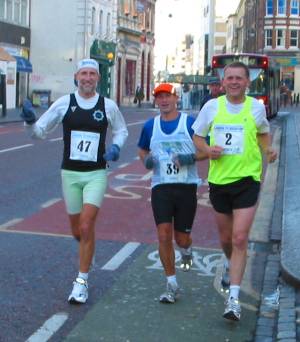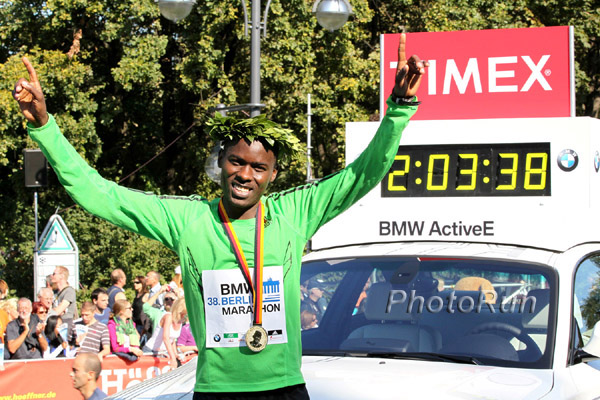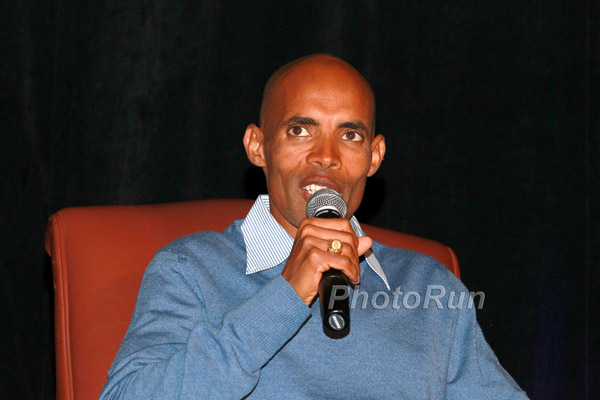Dreams Do Happen! A Take The Magic Step Interview with Irina Mikitenko


As the first German woman to break the 2:20-hour barrier at the real,- Berlin Marathon, 36 year-old Irina Mikitenko also became the fourth-fastest female marathon runner ever. A former top athlete on the track, she made a fast and remarkable transition to the marathon distance. At her debut in Berlin 2007 she was runner-up, she then won in London 2008 and now in Berlin. Irina is now leading in both the World Marathon Majors (WMM), 2007-2008 and 2008-2009 series. Irina, the strongest female marathon runner today, sat down with Take The Magic Step to talk about her motivation, her running and training, and her all important family.
How do you feel as fourth-fastest female runner of all time?
Irina Mikitenko: Very good-this is simply amazing. I never would have thought this would have happened in Berlin. I thought that a time of about 2:21 hours would be possible, but to run a sub-2:20 was actually not on the agenda. My dream was to run such a time at some future marathon-and now it has happened!
Did your husband and coach, Alexander Mikitenko, try to slow you down again as he did in London and last year in Berlin?
Irina (laughing): Yes, he did. The plan was that he is the boss until kilometer 30 and that I would then decide myself how to run. At km 35 he still told me I was running too fast. But I thought that I was OK and I told him that I now would run as I thought was right for me. In my last two marathons I had gained some experience and I know my body quite well now.
And who is in the driver’s seat at home, you or your husband?
Irina: Me, of course. Isn’t it mostly the woman who is the boss at home? At training, however, it should be the coach who takes the decisions.
At what stage of the race did you realize that you could win?
Irina: In the first half I ran according to our plan. The other women had started quite fast. After the first half of the race when I was overtaking one after the other I knew that I could win. From then on I also kept an eye on the time. At the end, however, I still could not believe it.
Did you, like other runners, think that the conditions in Berlin were ideal?
Irina: The conditions were perfect. The weather was very good and the wind not too strong. But mostly I have to thank my pacemakers and the spectators along the course. My pacemakers helped me until the end and the spectators were just great! I did not run a single meter without hearing the audience call my name and clap to cheer me on. That was amazing! I have never seen so many people at a marathon. Everything together just pushed me to be able to run this fantastic time.
What’s next?
Irina: First of all I have to recover. Due to the situation in the World Marathon Majors series I will fly to New York but won’t run there. An achievement such as the one in Berlin cannot occur every five weeks. To run in New York and not perform well, that’s not for me. When I race in the future, I want to be able to run as I did in Berlin on Sunday. Five weeks is way too short a time to recover-especially since I want to be able to compete successfully next year as well. Money is not everything. I already have been very successful this year and have done quite well in earnings.
Do you keep an eye on the World Marathon Majors ranking in which the best male and the best female runner share a million US dollars?
Irina: As I said, money is not everything. I run mainly because I love it and I would not put my health at risk because of money. This is also why I do not start in New York. But of course I look at the WMM series since I have a chance to win. That will depend on the other three: Gete Wami, Catherine Ndereba and Chunxiu Zhou. Of course it would be great to win such a great money prize. As an athlete you do not have an endless career. But if it does not work out this year, I still have a chance next year since right now I am in the lead for the 2008-2009 series.
Your family is probably very proud of you?
Irina: Oh yeah. My husband always, but my two children are also proud of me-they, however, make me proud as well. When I won in London they put up a big poster with air balloons at our house with the message: ‘Mom, we are proud of you.’ This makes a mother feel very special!
Do your children watch your races on TV?
Irina: Most of the time, yes. It depends a bit on the time of day. My oldest son [Alexander, 14 years old] is always watching me on TV. Vanessa [3 years old] is a little bit too young for the whole race. But she does realize what’s going on. She looks at the television and she’ll shout: ‘Faster, Mum, faster!’
How do you balance training with family life?
Irina: Vanessa often comes with me to training when I do track work. She’ll play in the sand of the long jump pit. When Alex is on holiday he comes with me on his bike when I do long runs. He will give me drinks, for example. He’s grown up doing sport and is used to being at competitions. He’s outside a lot and he’s found the motivation himself to get involved in sport. Alex plays in a football (soccer) club. And the he’ll say sometimes, ‘Let’s have a push-up competition.’
Who usually wins?
Irina (smiling): My husband still manages to win.
Is there a wall or a shelf with memorabilia of your successes somewhere around your house?
Irina: Yes, we started collecting everything a while ago. I have kept souvenirs, bibs, jerseys and other things from every race. You only live once after all and you like to look at your successes in retrospect. From London, for example, I have the photo from when I crossed the finish line. It is nice to be able to show friends and it also is motivating for myself.
Have expectations increased because of your success? Has this changed your training?
Irina: The expectations which I set for myself and those from other people have risen, yes. The pressure, however, has not increased much. I always want to compete well so I only decide to race when I am fit enough and I am convinced that I am capable of running in the top group. My preparation has changed compared to before. I had to learn a lot when preparing for the first two marathons. Before I trained much less. Nowadays I train up to 200 km per week but even I know that there is room for improvement.
What’s a typical day for you when you’re preparing for a marathon?
Irina: Alexander does shifts as a sheet metal worker. If he’s on the early shift, I take Vanessa to nursery and she’ll stay there till midday. Alex is usually at school until 3 pm. In the morning I do my main session of the day and this can be either a long run or speedwork on the track. After that I pick up Vanessa from the nursery and make lunch. If my husband comes home, I have an afternoon nap sometimes. Then we usually do the second session together. If it’s an easy session, my husband runs with me (Alexander used to be a good 5,000 m runner). My mother sometimes comes and looks after the children or my son helps out and looks after his sister.
What is your goal before a start?
Irina: My goal in every race is to win it. If I feel that I would be satisfied with a third place finish before the race starts, I would have already given up and I don’t need to go to the race at all. I always want to give my best.
No one has beaten you this year.
Irina: Yes, I have won all seven of my races. This is very motivating and helps me to go into each race with great confidence-especially after victories like the ones in London and Berlin. Such successes boost your self-confidence enormously.
What kind of race do youlike best-fast or tactical?
Irina: I prefer fast races like the last one in Berlin. But I can also run fast in championship races when I’m on form.
Have you been stronger since you changed to the marathon distance?
Irina: I think so, yes. This has to do with the fact that I have enjoyed training much more since I changed to the marathon and I have been successful which makes me feel stronger. But it also has to do with me knowing that I can improve even more. You get even more motivated when you know that you have not reached your limit yet. When you feel that you have reached your limit, it is more difficult to motivate yourself for training.
You have fulfilled many of your dreams this year–what will happen in 2009?
Irina: This year has been really great. First I won in London and then in Berlin where I had begun my marathon career just a year earlier. Actually, I had only wanted to win in Berlin this year. I can still hardly believe that it turned out to be such a fast time. My great goal for next year is the world championships in Berlin. It would be great if I was able to perform as well there as I did at the real,- Berlin Marathon. Of course, at the Flora London Marathon next April I want to defend my title-and then maybe I could manage to see something of the city.
And Paula Radcliffe?
Irina: If I could run against Paula Radcliffe in London, that would be great. We used to run against each other from time to time in track races, but the marathon is something else. Originally I’d thought we would meet in London this year. If that had been the case, it would have been a different race-and much faster.
You were also unlucky this summer when back problems prevented you from participating in the Olympics.
Irina: Prior to the Olympics it was not that I could not train at all, but I just was not able to do fast training sessions. I would get a sore back and pelvis from those sessions, so I had to call off Beijing. For the four weeks before Berlin I had been able to do fast runs again so I was well prepared.
Did you watch the women’s Olympic marathon on TV?
Irina: Yes, I watched the race on TV at night and was annoyed as I saw the great chance I missed because of my injury. At some stage I switched off the TV-I could not bear it anymore. Then I turned it back on because I was too curious and wanted to know how it would end.
This might be hard to say from a distance but do you think you would have had the courage to stay with Olympic winner Constantina Tomescu-Dita when she took off from the top group at the half marathon mark?
Irina: I actually am someone who dares to take a risk so I believe I would have run with her … but this is always hard to judge from home. For example, I don’t know how I would have coped with the conditions.
How about the Olympics in 2012?
Irina: That is a long way off but London is definitely a goal.
What advice would you give our readers who want to stay fit or would like to start doing sport?
Irina: You should set realistic goals for yourself. Take it step by step and you’ll find success. And when you are successful, it motivates you to go on!
posted on 10/17/2008
Special Update Note from Take The Magic Step:
Congratulations to Irina for winning the $500,000 World Marathon Majors 2008 title just ahead of last year’s winner, Gete Wami. A vote by World Marathon Majors race directors broke a tie between Mikitenko and Wami.
- Posted October 17, 2008
© Copyright 2008-2025 by Take The Magic Step®. All Rights Reserved.




